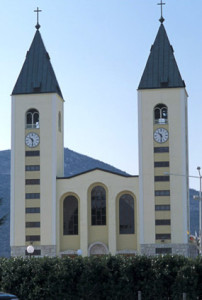Medjugorje Message: February 25, 2017
Dear children! Today I am calling you to profoundly live your faith and to implore the Most High to strengthen it, so that winds and storms cannot break it. May the roots of your faith be prayer and hope in eternal life. Already now, little children, work on yourselves in this time of grace, wherein God is giving you the grace–through renunciation and the call to conversion–to be people of clear and persevering faith and hope. Thank you for having responded to my call.
River of Light
March 2017
 Our Lady’s message for the upcoming Lenten season is focused on “faith and hope.” She says: “Today I am calling you to profoundly live your faith and to implore the Most High to strengthen it, so that winds and storms cannot break it. May the roots of your faith be prayer and hope in eternal life.” At this time of year as we move from winter into spring, we’ve witnessed the destructive force of “winds and storms”–some even hurricane or tornado-force–and how quickly and easily they can “break” even the strongest oak tree or well-built home. Our Lady is comparing each one of us to a mighty oak that will be challenged to endure severely destructive “winds and storms” during our life’s journey on this earth. She calls us “to profoundly live” our faith and “implore the Most High to strengthen it, so that winds and storms cannot break it.” How do we “profoundly live” our faith? And what are the “winds and storms” that might break it?
Our Lady’s message for the upcoming Lenten season is focused on “faith and hope.” She says: “Today I am calling you to profoundly live your faith and to implore the Most High to strengthen it, so that winds and storms cannot break it. May the roots of your faith be prayer and hope in eternal life.” At this time of year as we move from winter into spring, we’ve witnessed the destructive force of “winds and storms”–some even hurricane or tornado-force–and how quickly and easily they can “break” even the strongest oak tree or well-built home. Our Lady is comparing each one of us to a mighty oak that will be challenged to endure severely destructive “winds and storms” during our life’s journey on this earth. She calls us “to profoundly live” our faith and “implore the Most High to strengthen it, so that winds and storms cannot break it.” How do we “profoundly live” our faith? And what are the “winds and storms” that might break it?
Traditionally, during the holy season of Lent we add a more frequent and conscious practice of “prayer, fasting, and almsgiving” to our spirituality. This hallowed trio of religious exercises is meant to heighten our awareness and sensitize our hearts, keeping us more continually attuned to the Divine Presence within and without, increasing our overall “God-consciousness” from moment to moment. A corollary of fasting from large meals or other pleasures is the deliberate saving of money that would normally be spent on our own excesses and then donating it to the less fortunate (through a charity such as “Rice Bowl” or other organizations). In this way our individual and private Lenten practice moves out of an ascetic isolation by being joined to our communal membership in the larger Body of Christ. We can wed our Lenten prayer more closely to sacred scripture through the practice of Lectio Divina and attendance at extra weekday Eucharistic liturgies where the Word is proclaimed and explained. In addition, a daily practice of the rosary prayer and/or dedicated periods of meditative/contemplative silence will make for a “profound” living of our faith during this penitential season.
The “winds and storms” that threaten to break the tree of our faith are many, and during the 40 days of Lent we see them in the light of the temptations Christ faced in the desert. There are the external storms that blow upon us, like illnesses, job difficulties, interpersonal problems, deaths and divorces, financial woes, children’s crises, and many others. The great threat to our faith is not so much the external events of life, but how they “trigger” our internal false self or egoic “emotional programs for happiness.” Our overblown inner needs and insecurities demanding safety and security, affection and esteem, power and control–these demonic taunts from our inner nature are where our “tree” gets shaken, usually by some “triggering” or “tweaking” outer event. We are thus “tempted by the devil” as our Lord was in the wilderness. Our Lady tells us that our “roots”–the radical grounding of our faith that will enable us to withstand any storm or wind–must be “prayer and hope for eternal life.” In prayer we develop an intimate relationship with our loving, ever-present God, and along with it, an earnest desire and joyful expectancy of sharing an even fuller love relationship with him in heaven, after the “winds and storms” of earthly life are done. As we say in the Creed each Sunday, “We look forward to the resurrection of the dead and the LIFE of the world to come.” Filled with this prayerful hope, the “tree” of our faith has strong and stable “roots that go to China”!
Our Lady concludes her Lenten message by saying, “Already now, little children, work on yourselves in this time of grace, wherein God is giving you the grace–through renunciation and the call to conversion–to be people of clear and persevering faith and hope.” Indeed Lent is an extended “work period” for us to continue to “work out our salvation with fear and trembling,” as St. Paul says. But it is also a “time of grace” in which God, through the Church, carves out a special season for “renunciation” and “conversion.” These graces are tremendous aids to our inner work, and the penitential periods of Lent and Advent are heavenly gifts designed to draw us closer to Jesus Christ through greater conformity to the pattern for living he laid down in the Paschal Mystery.
In Medjugorje, Our Lady has facilitated a kind of “ongoing Lenten season” as a whole way of life geared toward a prayer-generated “conversion of heart“–her primary message there. She has graced us with the “renunciation” of fasting every Wednesday and Friday (year round), deepening our prayer life day by day, receiving the sacramental soul-food of daily Eucharist, and tending to an unending transformation of consciousness and behavior through monthly confession. All of these spiritual disciplines help us to “work on ourselves” as our Blessed Mother enjoins, so that we may become “people of clear and persevering faith and hope,” unbroken and unswayed by the high winds and raging storms of life’s temptations and moral tempests. Our Lady’s program at Medjugorje is the Church’s Lenten agenda, as well: to facilitate our rising to higher states and stages of human consciousness, helping us to “grow in maturity to the full stature of the person of Christ” (Eph 4:13) through the marvelous evolutionary process God designed for our eventual “divinization,” as the early Church Fathers called it. Happy Lent!
+ + + + + + + + +
& television)
corporations
high-level advisors
land
democracy
office;
communal gatherings
inspiring leaders of nonviolent resistance.
+ + + + + + + +
Wisdom from Pope Francis
Refugees are not pawns on the chessboard of humanity. They are children, women and men who leave or who are forced to leave their homes…The flesh of Christ is in the flesh of the refugees…. The faithful response is not to build a wall or to discriminate against Muslims, but to open our hearts and our homes to refugees of all faiths in recognition of our sacred call to protect and nourish life. There is a global epidemic of animosity and violence toward strangers, immigrants and refugees who are often considered a threat. We must move from attitudes of defensiveness and fear to acceptance, compassion and encounter….How often in the Bible the Lord asks us to welcome migrants and foreigners, reminding us that we too are foreigners!….A person who thinks only about building walls, and not building bridges, is not a Christian. This is not the gospel….Hitler didn’t steal the power, his people voted for him, and then he destroyed his people.
+ + + + + + + +
Mark Your Calendar
To reject the contemplative dimension of any religion is to reject the religion itself, however loyal one may be to its externals and rituals. This is because the contemplative dimension is the heart and soul of every religion. It initiates the movement into higher states of consciousness. The great wisdom teachings of the Vedas, Upanishads, Buddhist Sutras, Old and New Testaments, and the Koran bear witness to this truth. Right now there are about two billion Christians on the planet. If a significant portion of them were to embrace the contemplative dimension of the gospel, the emerging global society would experience a powerful surge toward enduring peace. If this contemplative dimension of the Christian religion is not presented, the Gospel is not being adequately preached.
– Fr. Thomas Keating, OCSO

